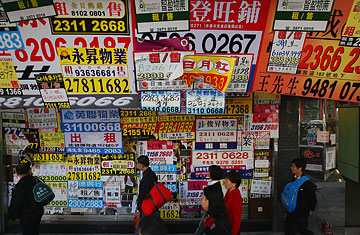
The gate of a vacant shop is covered by property agents ads in a shopping area of Hong Kong on Nov. 20, 2008
Even at the best of times, Hong Kong is one of the world's more stressed-out cities. Life for its seven million residents is a tension-filled mix of long working hours, fierce career competition, and the constant pressure to make more money to survive high rents and costs. So in these times of economic duress, with plunging stock prices and rising unemployment, that stress can boil over. In October, Caritas, a social services organization, set up a special government-funded hotline to counsel those suffering from the economic downturn. In the first month, Caritas received more than 1,000 calls from Hong Kong citizens who had lost their jobs or savings. "Hong Kong people are very stressful in their daily life," says Pinky Yung, a Caritas manager. "If they have no money, there will be fear and worry."
Hong Kong has good reason to be afraid. The economy is experiencing its worst slowdown since the SARS virus rampaged the city in 2003, stalling the economy for months on end. GDP shrank 0.5% in the third quarter — the second consecutive quarter-on-quarter contraction. That officially means Hong Kong is in a recession, and it doesn't look likely to end any time soon. The government lowered its forecast for 2008 growth from 4-5% to 3-3.5%. "The global financial turmoil has derailed the economic upturn that Hong Kong has enjoyed," government economist Helen Chan told reporters. (See pictures of the global financial crisis.)
The downturn has hit hard and fast. Hong Kong, like much of the rest of Asia, has been booming for several years; between 2004 and 2007, GDP growth averaged more than 7%. The economy was propelled forward by closer ties to China after Hong Kong was handed back to Beijing by Great Britain in 1997. Millions of mainland tourists flooded the city and spent their newfound wealth in Hong Kong's famous luxury shops. A rush of Chinese companies looking to tap international capital markets turned to Hong Kong's stock exchange, solidifying the city's status as a world-class financial hub in step with New York and London. (See 10 things to do in Hong Kong.)
Now, however, this Chinese territory's economy — highly dependent on financial services and trade — is proving vulnerable to the global downturn. As Europe and the U.S. slump, so have merchandise exports from Hong Kong, which in the third quarter grew at their slowest pace in more than six years. Hit by higher costs, slowing orders and tightening credit, thousands of factories owned by Hong Kong firms are closing up in southern China's industrial heartland. This week, HSBC, the city's largest bank, said it would layoff about 450 people in Hong Kong due to deteriorating business conditions and a poor outlook for next year. Supply chain-management firm Li and Fung, which sources clothing and other consumer goods for major American retailers and brands, announced this month that it was "undertaking a critical review of its cost structure" and could lay off as much as 4% of its local staff by early next year. Merrill Lynch expects local unemployment to reach 5% in 2009, up from the current 3.5%.
Worried about job security, Hong Kong citizens have begun cutting back, dampening another pillar of the city's growth: consumer spending. Simon Wong, president of the Hong Kong Federation of Restaurants and Related Trades, says sales at the city's 14,000 eateries have recently dropped off by as much as 20%. He fears many will be forced to shut down. "People are not so willing to spend their money eating out," he laments. (See TIME's special report on Hong Kong.)
Retail sales are also softening. Raphael le Masne, executive chairman of Shanghai Tang, says that the high-end fashion retailer began to experience modest declines in sales from early October, especially due to fewer high-spending tourists and travelers in the city. On some days in November, Shanghai Tang's boutiques in the ritzy Central district generated half the sales they had one year ago. "Things are deteriorating by the day," le Masne says.
The government has done what it can to try to boost growth. The Hong Kong Monetary Authority has sliced its benchmark interest rate to 1.5%, from 6% a year ago. But economists still expect next year to be worse. Goldman Sachs predicts GDP will grow only 2.2% in 2009. In the meantime, Hong Kong's glum populous can at least take comfort in the efforts of one of the city's more esoteric groups. In mid-November, several members collected in Causeway Bay, a popular shopping and restaurant district, to offer people "free" hugs. More such sessions are planned in coming weeks. "Particularly in the [current] financial situation, people need more care and attention," says Ricky Chow, a Hug Society organizer. Unfortunately, as Hong Kong's economy worsens, they may need much more than that.
See pictures of Hong Kong before and after its handover from Britain.
